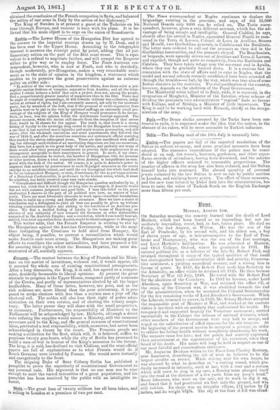i te frig. —The Lower House of the Hungarian Diet has agreed
to
the answer to the imperial rescript drawn up by M. Deak, and it J as been sent to the Upper House. According to the telegraphic account it answers the rescript point by point, adding that all par- liamentary action on the part of the Diet must cease. This is equi- valent to a refusal to negotiate further, and will compel the Emperor either to give way or to employ force. The Times Austrian cor- respondent, however, who is now at Pesth, and who is decidedly, though moderately, pro-Hungarian, makes a very remarkable state- ment as to the state of opinion in the kingdom, a statement which enables us to perceive the great preservative against an extreme policy on eitller side :
"In neither of the two parties, moderates and ultras, does there exist a per- ceptible section desirous of complete separation from Austria; and all the infor- mation I obtain induces a belief that such a project does not, among the people, find a proportionately greater number of supporters than in the Diet. There may be anger at vexations proceedings, ill will towards military tax-collectors, indig- nation at refusal of rights, but I am constantly assured, not only by the moderate party, but by members of the Left, that if the proposal of entire separation from .Austria were to be put to the vote by universal suffrage an extremely small per- centage of the subjects of the King of Hungary would pronounce in its favour. Such, at least, was the opinion before the unfortunate rescript appeared. The present moment, when the nation still smarts from the reception of that severe blow, would be ill chosen for the appeal. The truth is, that there is a strong feeling of loyalty to the sovereign deep rooted in the Hungarian heart—so strong a one that it has survived much injustice and much wanton provocation, and still exists, after the wholesale executions and cruel punishments that followed the war of 1848-9, and after the countless vexations and systematic official worrying That marked the eleven subsequent years. There are men maddened with suffer- lag, but although such victims of an unrelenting despotism are but too numerous, they form but a speck in the great body of the nation, and probably not many of them would allow their personal resentments to prevent their acquiescence in an arrangement acceptable to their countrymen in general. In short, if my obser- vations and information be correct, the number of Hungarians who, for personal or other motives, desire a total separation from Austria, is insignificant as com- pared with the balk of the nation. Of course, it is quite in Austria's power to augment that number by perseverance in such ill-judged measures as the recent rescript to an indefinite extent, and until the cry throughout the whole land shall be for an independent Hungary, or even, if necessary, for the as yet vague scheme
i
of a Danubian Confederation, n preference to the ancient union, which, it must be admitted, has lately received some very rude shocks. "Complicated and difficult though the Hungarian question undoubtedly be, I cannot but think that it would take no long time to arrange it, if Austria would but act with common judgment and good faith. I base this belief on the great moderation I observe on the part of all political men here, no matter of what party. There are most fa'vourable elements to work upon—excellent foundations whereon to build up a strong and durable structure. Here we have a desire of onciliation and a willingness to yield all that can possibly be given up without vitiating constitutional rights and sinking to the condition of an Austrian pro- -vince. We find a decided feeling of loyalty to the house of Hapsburg; an absence of any antipathy of race towards the Germans or other nationalities comprised in the Austrian Empire; and a conviction, which I constantly hear ad- mitted, that total separation from Austria would be disadvantageous to Hungary." This writer adds, that the French Emperor is striving to stir up -the Hungarians against the Austrian Government, while at the same time instigating °the Croatians to hold aloof from Hungary, his -object being, if possible, to prevent a reconciliation which would snake Austria once more strong. The Hungarians are Making great efforts to conciliate the minor nationalities, and have prepared a bill for assuring their rights which the Rouman Deputies, the most dis- contented of all, cordially approve.






























 Previous page
Previous page